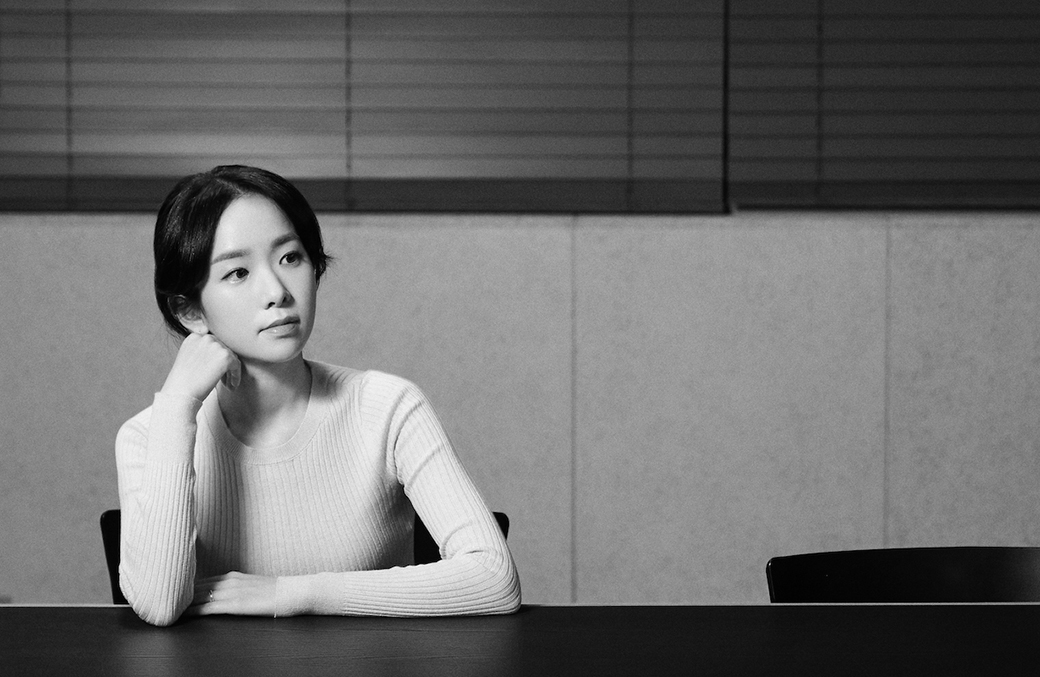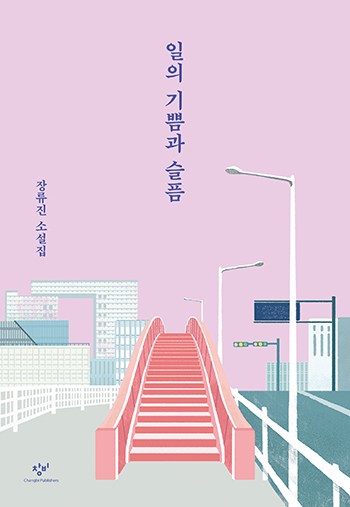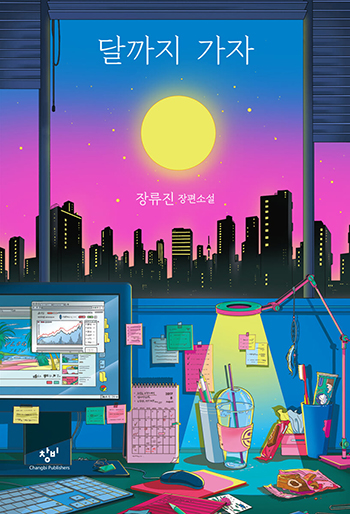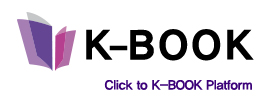|
Korean Authors
Writer Jang Ryu-Jin A Writer of Sympathy-evoking Hyper-realistic Stories
2022.04.04
Writer Jang Ryu-Jin made her debut by winning the 21st Changbi Prize for New Figures in Literature with her short novel The Pleasures and Sorrows of Work in 2018. In October the same year, the book was available for free online, recording 400 thousand views and going viral on Social Media. The popularity continued with her short story collection The Pleasures and Sorrows of Work (Changbi Publishers), published in 2019, and Moonbound (Changbi Publishers), published in January this year. With a historic record of making the 4th printing in less than 2 months since the initial printing, readers commented that the realistic background and settings were a perfect replica of their “own stories.” Following is an interview with writer Jang Ryu-Jin, who has captured the minds of the MZ Generation by telling the story of 2030 with empathy and hyper-realism.

Please introduce yourself to our readers.
Hi, I’m Jang Ryu-Jin, a novelist in Korea. I majored in Sociology at university and worked as a product manager at an IT company. I began writing novels when I was taking writing classes at a culture center. I was working at the company then. Then, I chose to go to a graduate school to study more about writing, and I completed a graduate degree in Korean Literature. I made my debut as a writer in 2018 when I won the Changbi Prize for New Figures in Literature with The Pleasures and Sorrows of Work, and I have been writing stories in earnest since then..
The Pleasures and Sorrows of Work

You have received much attention from the young generation by drawing empathy from them with your new title, Moonbound. What do you think is the reason for the popularity?
Well, I’m not sure. I don’t think it’s something a writer can say for sure decisively. But I think I write sentences and stories in a style that I like as a reader. So perhaps that style, my preference, is universal.

Where do you usually get inspiration and key sources for stories? Also, if there is an element that impacts your writing, what is it?
I often fall into my imaginary world, thinking about useless things (or those that ‘look’ useless). And that’s where I usually get the sources for my stories. I named this “imagination that doesn’t go far.” It’s literally an imagination that does not go far off the daily life, only by a little bit. To take some examples, I imagine “What if this kind of person was put in a situation like this? How would he/she act?” or “What if I said something differently? Would it change the flow in the conversation?” in common situations or dialogues I have in daily life.
Moonbound

You worked at an IT company for 9 years before choosing to become a full-time author writing fiction. What motivated you to make that decision?
While majoring in sociology at university for 4 years, I used to write my thoughts in logically, though they were not something literary. Then after graduation, I got to join an IT company amidst a national unemployment crisis. The job itself was quite satisfying, it suited my aptitude, but there was always one thing on my mind – the strong desire to “write.” I had almost no opportunity to write something of my own at the company (except emails or proposals). So, I personally looked for writing classes, and there I came across a fiction-writing class held at a culture center. That was the moment of destiny. There were many other writing classes too, but as I was so into reading short novels written by contemporary Korean writers at that time, I chose the fiction-writing classes.

What is the biggest difference between the life of an office worker and the life of a writer?
If you only think about the “writing novels” part, the biggest difference is that I work alone. It’s because, at a company, any other person can do the job you were doing and make similar, or sometimes exactly the same, outcomes. But novels, it is only you that can finish them. That originality is the biggest difference. It’s mostly good, but sometimes it’s what makes writing hard and burdensome.

Is there a writer that you particularly like or a writer that impacted your art world? If you had one, how were you affected by him/her?
I began writing fiction after reading short novels of active contemporary novelists in Korea. In the time frame, the works would range from the 2000s to today. So, I rather couldn’t read old classical literature. Among English-American writers, I like Gabriel Jevin, Joyce Carroll Oates, and Raymond Carver.
There’s a moment when the unarranged fragments of little imagination come

What is the thing that you prioritize the most when writing novels?
I try to be punctual. I try not to pass the midnight of the deadline date, and if I think I might be later than that, I tell the person in charge and set a new date in advance.

What message do you want to tell the world through your books?
Well, I think my writings are not a “message” but a “story.” When I write, I know that the message I want to deliver is in myself. But it is very dim and indistinct. So, just with the idea that “it is there, though not vivid and standing out,” I begin writing stories. I think the message melts into the story as I write without even noticing it.

Please tell us about your future plans.
I’m planning to announce short novels in literary magazines. I will also continue writing stories, making full-length novels as well.
#Jang Ryu-Jin#Hyper-realism#MZ Generation#The Pleasures and Sorrows of Work#Moonbound |
Pre Megazine
-

Jakkajungsin Publishing Co.
VOL.69
2024.04 -

Writer Yun Jung-Eun
VOL.69
2024.04 -

Jumping Books Publishing House
VOL.68
2024.03 -

Writer Kim Hwa-Jin
VOL.68
2024.03 -

Publisher Hyohyung
VOL.67
2024.02 -

Writer Minha
VOL.67
2024.02 -

Almond Publishing
VOL.66
2024.01 -

Writer Kwon Jung-Min
VOL.66
2024.01 -

Hakgojae Publishers
VOL.65
2023.12 -

Writer Kim Hye-Jung
VOL.65
2023.12 -

Eidos Publishing House
VOL.64
2023.11 -

Writer Hwang In-Chan
VOL.64
2023.11 -

Munhakdongne
VOL.63
2023.10 -

Writer Chang Kang-myoung
VOL.63
2023.10 -

Happywell Publishing
VOL.62
2023.09 -

Writer Baik Soulinne
VOL.62
2023.09 -

Dasan Contents Group (Dasan Books)
VOL.61
2023.08 -

Writer Lim Kyoung-Sun
VOL.61
2023.08 -

SpringSunshine Publishing Co.
VOL.60
2023.07 -

Writer Lee Kyung-Hye
VOL.60
2023.07 -

Human Cube
VOL.59
2023.06 -

Doctor Jeong Jae-Seung
VOL.59
2023.06 -

Anonbooks
VOL.58
2023.05 -

Writer Son Bo-Mi
VOL.58
2023.05 -

Namhaebomnal
VOL.57
2023.04 -

Writer Kim Bo-Young
VOL.57
2023.04 -

Hugo Publishing
VOL.56
2023.03 -

Writer Cho Kwang-Hee
VOL.56
2023.03 -

Balgeunmirae Publishing Co.
VOL.55
2023.02 -

Writer Lee Byung-Ryul
VOL.55
2023.02 -

Wisdom House, Inc
VOL.54
2023.01 -

Writer Jeong Jia
VOL.54
2023.01 -

Humanitas
VOL.53
2022.12 -

Writer Kim Yeon-Su
VOL.53
2022.12 -

Songsongbooks
VOL.52
2022.11 -

Writer Eun Hee-Kyung
VOL.52
2022.11 -

Bombom Publishing Co.
VOL.51
2022.10 -

Writer Jiwon Yu
VOL.51
2022.10 -

Hangilsa Publishing Co., Ltd.
VOL.50
2022.09 -

Writer Kim Won-Young
VOL.50
2022.09 -

Moksu Publishing Company
VOL.49
2022.08 -

Writer Yoo Sun-Kyong
VOL.49
2022.08 -

Next Wave
VOL.48
2022.07 -

Writer Park Sang-Young
VOL.48
2022.07 -

A Thousand Hopes
VOL.47
2022.06 -

Writer Bora Chung
VOL.47
2022.06 -

Woongjin ThinkBig
VOL.46
2022.05 -

Dr. Oh Eun-Young
VOL.46
2022.05 -

JECHEOLSO Publishing House
VOL.45
2022.04 -

Writer Jang Ryu-Jin
VOL.45
2022.04 -

Changbi Publishers
VOL.44
2022.03 -

Writer Kim Ho-Yeon
VOL.44
2022.03 -

Mati Books
VOL.43
2022.02 -

Writer Lee Kkoch-Nim
VOL.43
2022.02 -

Picturebook Gongjackso
VOL.42
2022.01 -

Writer Kim Sang-Wook
VOL.42
2022.01 -

Writer So-yeon Park
VOL.42
2022.01 -

Writer Yoo Eun sil
VOL.42
2022.01 -

Kungree Press
VOL.41
2021.12 -

Writer Kim Lily
VOL.41
2021.12 -

Writer Park Yeon-jun
VOL.41
2021.12 -

Writer Yi Hyeon
VOL.41
2021.12 -

A deeper world told through picture books 'Iyagikot Publishing (Story Flower)'
VOL.12
2019.06 -

Author Jeon Min-hee
VOL.12
2019.06 -

Illustrator Kim Hwan-Young
VOL.13
2019.07 -

Travelers sailing through the sea of knowledge - 'Across Publishing Group Inc.'
VOL.13
2019.07 -

Genre Novel Publisher 'Arzak Livres'
VOL.14
2019.08 -

Author Lee Yong-han
VOL.14
2019.08 -

Wookwan Sunim
VOL.15
2019.09 -

East-Asia Publishing
VOL.15
2019.09 -

Author Jo Jung-rae
VOL.16
2019.10 -

EunHaeng NaMu Publishing
VOL.16
2019.10 -

Writer Heo Kyo bum
VOL.40
2021.11 -

Writer Kim So-Young
VOL.40
2021.11 -

Author-illustrator Kim Sang Keun
VOL.40
2021.11 -

ACHIMDAL BOOKS
VOL.40
2021.11 -

Author Kang Gyeong-su
VOL.17
2019.11 -

Moonji Publishing Belongs to the Literary Community
VOL.17
2019.11 -

Author Kim Yun-jeong
VOL.18
2019.12 -

I-Seum
VOL.18
2019.12 -

Kim Cho-Yeop
VOL.19
2020.02 -

Creating a window into the future with books
VOL.19
2020.02 -

Author Serang Chung
VOL.20
2020.03 -

Hey Uhm
VOL.20
2020.03 -

Writer Lim Hong-Tek
VOL.21
2020.04 -

BIR
VOL.21
2020.04 -

Writer Song Mikyoung
VOL.39
2021.10 -

Author-illustrator Kim Dong Su
VOL.39
2021.10 -

Writer Lee Seula
VOL.39
2021.10 -

Tabi Books
VOL.39
2021.10 -

Writer Kim Soo-hyun
VOL.38
2021.09 -

Author-illustrator Lee Myoung Ae
VOL.38
2021.09 -

Writer Hwang Sunmi
VOL.38
2021.09 -

Kidari Publishing Co.
VOL.38
2021.09 -

Writer Sohn Won-Pyung
VOL.22
2020.05 -

Woods of Mind's Books
VOL.22
2020.05 -

Writer Heungeul
VOL.23
2020.06 -

Gloyeon
VOL.23
2020.06 -

Maumsanchaek
VOL.24
2020.07 -

Winners of the 2021 Bologna Ragazzi Award
VOL.37
2021.08 -

Picture book artist Lee Suzy
VOL.37
2021.08 -

Author-illustrator Yi Gee Eun
VOL.37
2021.08 -

Hubble
VOL.37
2021.08 -

Writer Baek Se-Hee
VOL.25
2020.08 -

Bearbooks Inc.
VOL.25
2020.08 -

Author Baek Hee-Na
VOL.26
2020.09 -

Yuksabipyoungsa
VOL.26
2020.09 -

Writer Kang Hwa-Gil
VOL.27
2020.10 -

Kinderland (Bandal)
VOL.27
2020.10 -

Writer Ha wann
VOL.36
2021.07 -

Author-illustrator Myung Soojung
VOL.36
2021.07 -

Writer Jung Yeo-Wool
VOL.36
2021.07 -

Publisher EcoLivres
VOL.36
2021.07 -

Writer Lee Geumi
VOL.28
2020.11 -

Sakyejul
VOL.28
2020.11 -

Writer Kim Keum-Hee
VOL.29
2020.12 -

Geulhangari
VOL.29
2020.12 -

Writer Cheon Seon-Ran
VOL.30
2021.01 -

Hyang Publishing House
VOL.30
2021.01 -

Writer Lee Hee-Young
VOL.31
2021.02 -

Sanzini
VOL.31
2021.02 -

Publisher Prunsoop
VOL.32
2021.03 -

Writer Sim Yun-Kyung
VOL.32
2021.03 -

Hanbit Media
VOL.35
2021.06 -

Hyeonamsa
VOL.33
2021.04 -

Author-illustrator Noh Inkyung
VOL.33
2021.04 -

Writer Cho Won-Jae
VOL.35
2021.06 -

Writer Kim Jung-Mi
VOL.34
2021.05 -

Safehouse Inc.
VOL.34
2021.05












